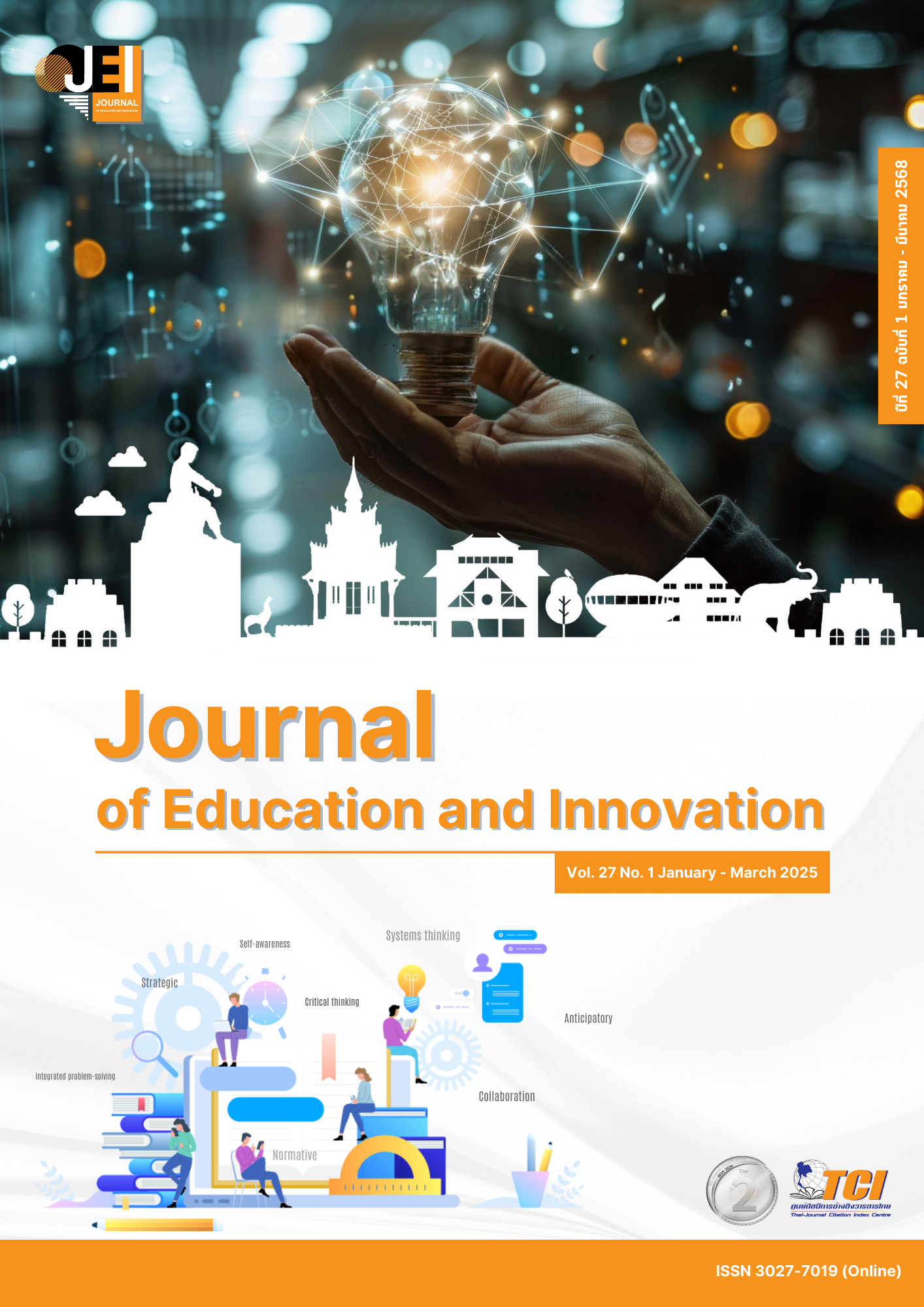THE PROJECT – BASED LEARNING MANAGEMENT OF FOOTBALL FOR ENHANCING TEACHER PROFESSIONAL COMPETENCY OF STUDENTS MAJORING IN PHYSICAL EDUCATION
Main Article Content
Abstract
This study aimed to 1) study and create a project-based learning management plan that affects teachers' professional competence, 2) study the learning achievement in football through project-based learning management, and 3) study the results of the satisfaction assessment of project-based learning management in football. The sample group used in this research was 60 first-year students of Nakhon Sawan Rajabhat University who registered for football subject in the second semester of the academic year 2023. They were selected by purposive sampling. The sample group who responded to the teacher professional competence evaluation form was team managers, coaches, and assistant coaches who participated in the Football Education Cup activity, a total of 136 teams, totaling 408 people. The total sample size was calculated using the Krejcie and Morgan table, which was 196 people. The research instruments consisted of a learning management plan using the project-based learning process, a teacher professional competency assessment form, an achievement test, and a satisfaction assessment form for project-based learning management. The results were analyzed using the mean and standard deviation. The research results found that 1) The results of the study on project-based learning management in football subject to promote teacher professional competence of Physical Education students promoted teacher professional competence of Physical Education students, with a mean value of 4.40 and a standard deviation of 0.55, which was at a high level. The competencies that occurred the most in Physical Education students were: (1) Volunteer competency, public spirit, equal to = 4.47, S.D. = 0.56; (2) Teamwork competency, equal to
= 4.42, S.D. = 0.57; and (3) Teacher personality competency and attitude in adapting, equal to
= 4.41, S.D. = 0.54, respectively. 2) The achievement in learning football subject by using project-based learning in football subject to promote professional competency of Physical Education students was equal to 80.83, which passed the set criterion of 80/80. 3) The result of the study of satisfaction with project-based learning in football subject, which had an evaluation result with a mean value of 4.34 and a standard deviation value of 0.56, which was at a high level.
Article Details

This work is licensed under a Creative Commons Attribution-NonCommercial-NoDerivatives 4.0 International License.
The owner of the article does not copy or violate any of its copyright. If any copyright infringement occurs or prosecution, in any case, the Editorial Board is not involved in all the rights to the owner of the article to be performed.
References
Bantumphon, W. (2011). Effects of project-based learning management on the development of Mathayom 1 students (Master thesis). Khon Kaen: Khon Kaen University.
Chanwin, P., Yokin, J., Chiaprasert, S., Dissara, W., & Wichchawattanangkun, A. (2021). Cooperative learning design to enhance learning outcomes of life skill subject, Boromarajonani College of Nursing, Nakhon Si Thammarat. Mahamakut Graduate School Journal, 19(2), 36-48.
Fikru Debebe Mekonnen. (2020). Evaluating the effectiveness of ‘learning by doing’ teaching strategy in a research methodology course, Hargeisa, Somaliland. African Education Research Journal, 8(1), 13-19.
Kobkhuntod, J., Jainim, P., & Phungphae, P. (2023). Department of Social Studies Teaching in the 21th century using problem-based. PNRU Academic Journal, 2(1), 36-46.
Khemmani, T. (2013). Science of Teaching: Knowledge for Effective Learning Management (17th ed.). Bangkok: Chulalongkorn University Press.
Makmee, P. (2011). Problem-based learning. Eau Heritage Journal Social Science and Humanities, 1(1), 7-14.
McClelland, D. C. (1973). Test for Competence rather than intelligence. American Psychologists, 17(7), 1-14.
Office of the National Economic and Social Development Institute. (2020). National strategic plan 2018-2037. Retrieved December 18, 2023, from https://www.gotoknow.org
Ruengsrianan, R. (2019). Development of problem-based learning (PBL) on life safety Health and Physical Education learning group Mathayom 2 level (Master thesis). Maha Sarakham: Rajabhat Maha Sarakham University.
Sonsamrit, N. (2020). Teacher’s ability development process in integrated student-centered learning management through participatory action research. Journal of Teacher Professional Development, 1(3), 94–108.
Sornchai, W., Wiriyakit, S., & Kamlangtawee, J. (2020). The results of cooperative learning management that affect the competencies required for learners of undergraduate students at Nakhon Sawan Rajabhat University. Nakhon Sawan: Faculty of Education, Nakhon Sawan Rajabhat University.
Sinthungam, Y. (2014). Problem-based learning (PBL). Retrieved from http://www.mail.vecharkarn.com/vblog/37131
Saavedra, A. R., & Darleen, V. O. (2012). Learning 21st century skills requires 21st century teaching. Phi Delta Kappan, Sage Journals, 94(2), 8-12
Srisa-ard, B. (2002). Basic research (7th ed.). Bangkok: Suviriyasan.
Yolao D., et al. (2014). A study of PBL learning management from the project to create a knowledge set to enhance 21st century skills of children and youth: from the successful experience of Thai schools. Bangkok: Thipphawisut.


